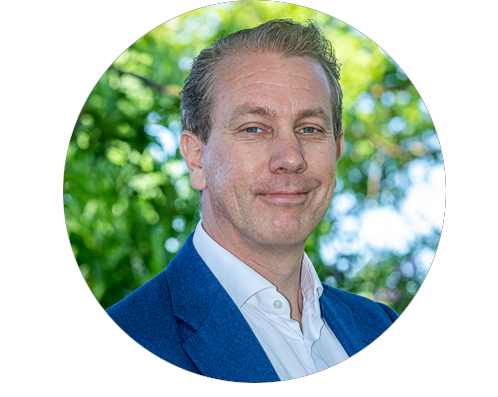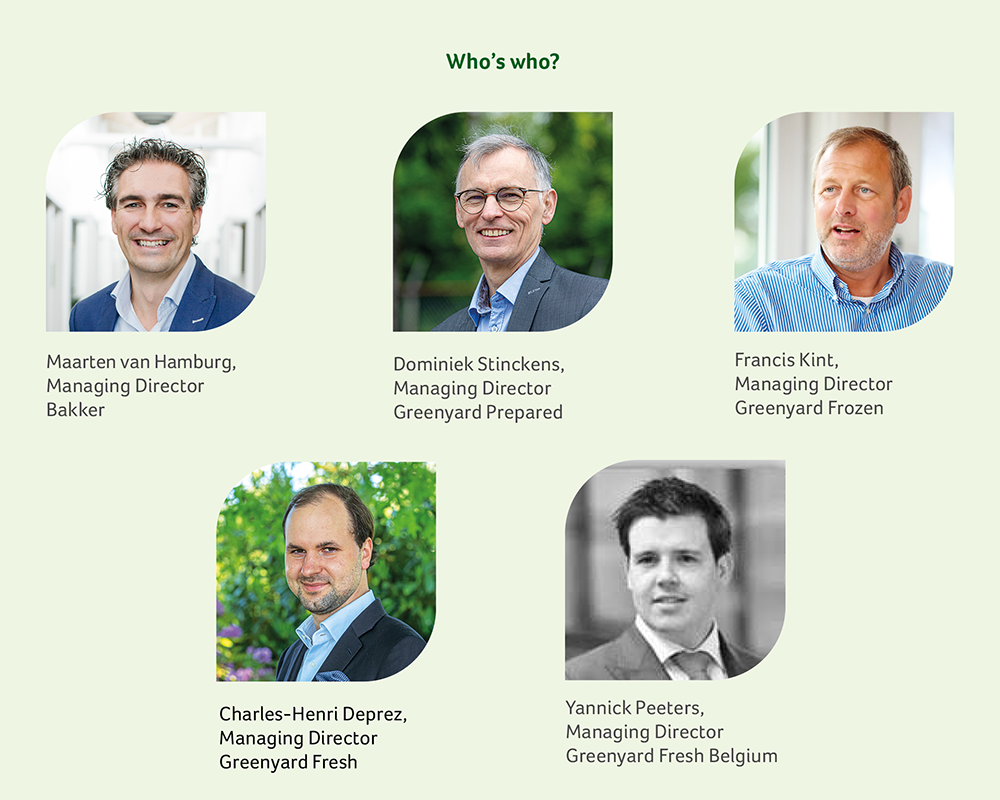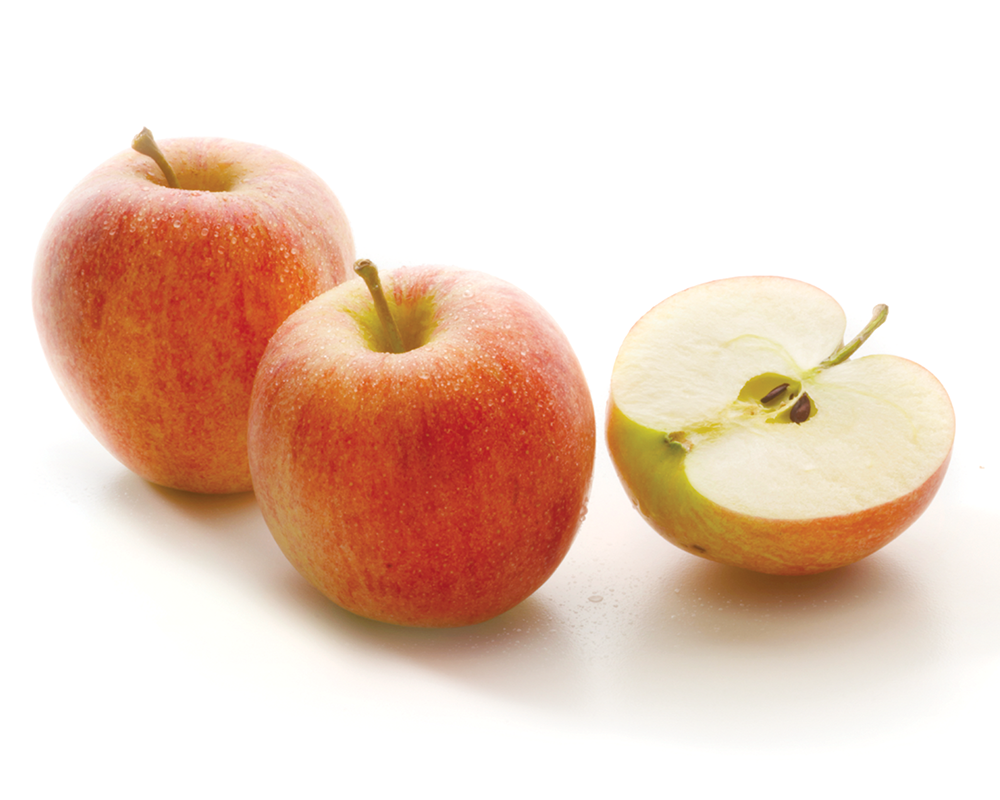

Florens Slob: “When I started at Greenyard, people told me sustainability is part of Greenyard’s DNA. But what does sustainability mean for Greenyard?”
Maarten van Hamburg: “Sustainability is an integral part of our company’s strategy. Our products – fruit and vegetables in all their forms –are inherently healthy and sustainable. Adding more plant-based food to our diets is generally seen as the solution to feed the growing world’s population while reducing our global environmental impact. In our daily activities as a company, we ensure the maximum, year-round availability of high-quality fruit and vegetables and we stimulate consumption by making them more convenient to consume and prepare like we do for example with our meal kits.”
Dominiek Stinckens: “Sustainability is not just some project within our company. It is something we live and breathe every single day. All our products come from nature; it is our principal resource. Speaking for the Prepared division, all the products we use are grown within a range of 50 kilometres of our plant. This makes us particularly aware of the impact we have as a company, and of the fact that there will simply be no business in the future if we don’t do everything, we can to preserve our planet. To prepare and preserve these products we use quite some energy of course. For many years already, we have a strong focus on saving energy where we can. Today, we are working on the transition to green energy to make our whole operation ever more sustainable.”
Florens Slob: “Let’s shift to the consumers’ perspective. How can we help them live healthier lives and at the same time reduce their footprint?”
Francis Kint: “Convenience is definitively one of the key words here. It can take quite some efforts to prepare dinner for an entire family. By developing products that are easy to prepare and easy to store, while offering great taste, we stimulate them to go for the healthy and sustainable option every time. Our Frozen products also prevent food waste – you only take the exact amount you need to prepare your meal and keep the rest in your freezer for later. Nothing gets wasted! In that sense, I think our frozen products can even act as an inflation buster for many people.”
Charles-Henri Deprez: “Healthy food is top of mind with consumers. We need to use the knowledge and the ability we have in our company to turn fruit and vegetables into innovative, plant-based products, that are spot-on with consumer trends. Our meal-kits are an existing but excellent example of this. Co-creation with our customers is crucial in all of this as well as the positioning of these products within their stores and product portfolio. We can also use our expertise to help both customers (retailers) and consumers make the right decisions in terms of sustainability – develop together a tailored and well-balanced assortment of fruit and vegetables, determine the best origin for every season or advise on the best packaging for each product.”

Florens Slob: “As a connecting partner between growers and retailers, how can we use our impact to improve agricultural practices and create more sustainable food supply chains?”
Francis Kint: “Growing and preserving fruits and vegetables makes use of the scarce natural resources as healthy soil, fresh water and a good biodiversity. Even though we are an essential sector – we are feeding the world – everyone is very much aware we need to act to get back within planetary boundaries. Many of our farmers are experiencing the effects of climate change first-hand, with increasingly extreme weather conditions threatening their harvests and their livelihoods. Our demand-driven model including our Integrated Grower Relationships is crucial in this respect – growing what is needed in the market instead of trying to market what is grown. Close collaboration also enables us to steer growers in the direction of more sustainable agricultural methods, with an increasing focus on regenerative farming and safeguarding biodiversity.”
Charles-Henri Deprez: “Responsible sourcing is another important domain where we can have impact as a major player. We should never forget that our products are the result of hard work, done by many people around the world. Together with the customers we serve, it is our duty and responsibility to improve their working conditions and ensure a fair reward for everyone that is active in our chain.”
Florens Slob: “The direct impact of our own operations only accounts for a relatively small part of our total footprint. Are we doing enough there?”
Yannick Peeters: “We are working in a sector with very tight margins. Saving energy and water, optimising transport and preventing waste are all part of our daily routines. They are essential in our business, both from an economical and an ecological point of view. Over the years, we have also invested in advanced systems to better integrate our operations with our customers. We combine the expertise of our people with data-driven models to predict demand and make accurate forecasts to guide our growers, thereby reducing waste. To make further progress we will also need to take more fundamental steps. Our commitment to switch to green electricity in all our plants by 2025 is a good example of this. Making the transition to zero-emission transport will be another important step.”
Dominiek Stinckens: “In the Long Fresh division we rely much more on industrial processes, with a considerable consumption of water and energy. We have come a long way in this respect. Just to give you an idea: twenty years ago, we needed about 17 litres of water to produce one litre of canned vegetables, today we only need 5 litres. Most of the low-hanging fruit has been picked. This does not mean there is no room for improvement, because there is still plenty. My biggest dream is to become completely self-sufficient in our operations, by maximising the re-use of water, and having onsite production of energy which could even include building a biomass plant to generate electricity from our organic waste, for example.”

Florens Slob: “The global economy is faced with challenging times. Do current market conditions, mean we sometimes must compromise on sustainability?”
Maarten van Hamburg: “There certainly is some pressure from the market and an even greater focus than usual on prices and margins. But even in these difficult circumstances it’s important that we show leadership and keep our eyes on the long term. The urgency to reduce our carbon footprint is not going away and we see that many of our stakeholders – customers and end-consumers included – keep moving in that same direction. We need to use the strong relationships we have built with our customers to continue our journey together.”
Yannick Peeters: “At the same time, I think the current macro-economic situation is reminding us that making healthy food available at affordable prices is a major part of our mission. If we cannot market our products at a reasonable cost, we are driving consumers to heavily processed, cheaper alternatives that are just not as healthy and sustainable as what we have to offer. It is now more than ever up to us to work with our customers to provide consumers with a diverse offering of fruit and vegetables for every budget.”
Florens Slob: “I think this final statement actually brings us back to the essence of where we need to go in the future – towards more plant-based diets, with healthy products that are affordable for everyone and at the same time reduce our impact on the planet. I want to make one addition: keeping our products affordable in the future will also ask for investments today. Acting now simply is the best option in the run, and probably the only one. And if we are to safeguard the availability of healthy produce for future generations, we also need to ensure fair value along the chain. That is something we will need to tackle all together.
Thank you for your insights today, and for your efforts to realise our sustainability roadmap, by continuously working closely together with both customers and growers. I am convinced that our Integrated Customer Relationships (ICR), in combination with a similar approach with our growers is the only way forward to a more sustainable future of food. To conclude all of this, we can be assured plant-based is the future, both from an ecological, an economical, a health and an accessibility point of view!”